Analyzing Constructivism's Critique of Realism and Liberalism
VerifiedAdded on 2023/04/19
|6
|1460
|124
Essay
AI Summary
This essay delves into the theory of constructivism within the field of international relations, contrasting it with the perspectives of realism and liberalism. It argues that constructivism addresses the shortcomings of both realism and liberalism by offering an ideational view that emphasizes the role of ideas and non-state actors in shaping international dynamics. The essay provides a critical analysis of realism's state-centric focus and liberalism's idealistic approach, highlighting how constructivism incorporates the influence of multinational corporations, international organizations, and evolving international political situations. The essay also underscores the importance of changing international relations and the impact of non-state actors. The essay also discusses how the constructivist approach addresses the lacunas of both realism and liberalism by providing a more nuanced and comprehensive understanding of international relations.
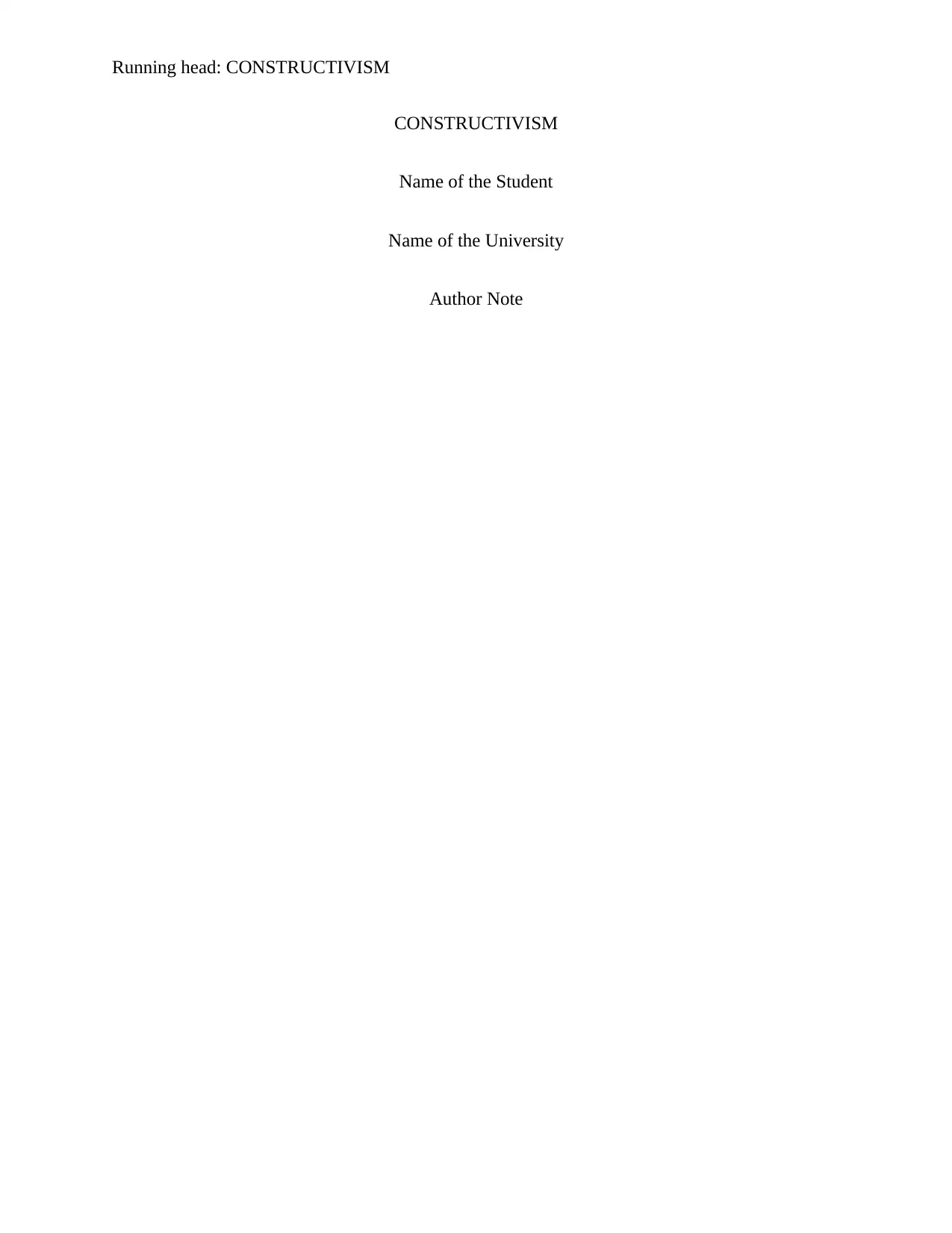
Running head: CONSTRUCTIVISM
CONSTRUCTIVISM
Name of the Student
Name of the University
Author Note
CONSTRUCTIVISM
Name of the Student
Name of the University
Author Note
Paraphrase This Document
Need a fresh take? Get an instant paraphrase of this document with our AI Paraphraser
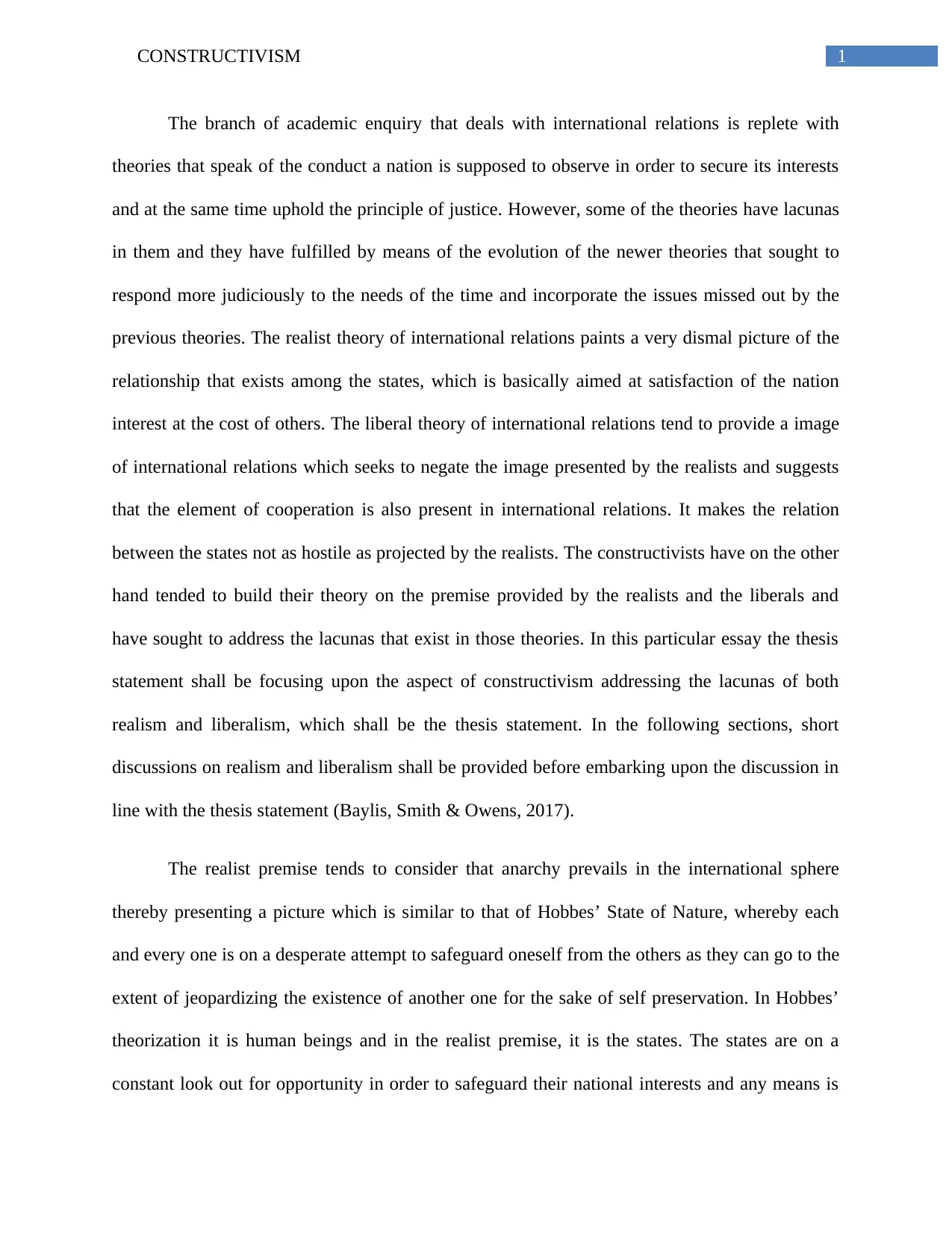
1CONSTRUCTIVISM
The branch of academic enquiry that deals with international relations is replete with
theories that speak of the conduct a nation is supposed to observe in order to secure its interests
and at the same time uphold the principle of justice. However, some of the theories have lacunas
in them and they have fulfilled by means of the evolution of the newer theories that sought to
respond more judiciously to the needs of the time and incorporate the issues missed out by the
previous theories. The realist theory of international relations paints a very dismal picture of the
relationship that exists among the states, which is basically aimed at satisfaction of the nation
interest at the cost of others. The liberal theory of international relations tend to provide a image
of international relations which seeks to negate the image presented by the realists and suggests
that the element of cooperation is also present in international relations. It makes the relation
between the states not as hostile as projected by the realists. The constructivists have on the other
hand tended to build their theory on the premise provided by the realists and the liberals and
have sought to address the lacunas that exist in those theories. In this particular essay the thesis
statement shall be focusing upon the aspect of constructivism addressing the lacunas of both
realism and liberalism, which shall be the thesis statement. In the following sections, short
discussions on realism and liberalism shall be provided before embarking upon the discussion in
line with the thesis statement (Baylis, Smith & Owens, 2017).
The realist premise tends to consider that anarchy prevails in the international sphere
thereby presenting a picture which is similar to that of Hobbes’ State of Nature, whereby each
and every one is on a desperate attempt to safeguard oneself from the others as they can go to the
extent of jeopardizing the existence of another one for the sake of self preservation. In Hobbes’
theorization it is human beings and in the realist premise, it is the states. The states are on a
constant look out for opportunity in order to safeguard their national interests and any means is
The branch of academic enquiry that deals with international relations is replete with
theories that speak of the conduct a nation is supposed to observe in order to secure its interests
and at the same time uphold the principle of justice. However, some of the theories have lacunas
in them and they have fulfilled by means of the evolution of the newer theories that sought to
respond more judiciously to the needs of the time and incorporate the issues missed out by the
previous theories. The realist theory of international relations paints a very dismal picture of the
relationship that exists among the states, which is basically aimed at satisfaction of the nation
interest at the cost of others. The liberal theory of international relations tend to provide a image
of international relations which seeks to negate the image presented by the realists and suggests
that the element of cooperation is also present in international relations. It makes the relation
between the states not as hostile as projected by the realists. The constructivists have on the other
hand tended to build their theory on the premise provided by the realists and the liberals and
have sought to address the lacunas that exist in those theories. In this particular essay the thesis
statement shall be focusing upon the aspect of constructivism addressing the lacunas of both
realism and liberalism, which shall be the thesis statement. In the following sections, short
discussions on realism and liberalism shall be provided before embarking upon the discussion in
line with the thesis statement (Baylis, Smith & Owens, 2017).
The realist premise tends to consider that anarchy prevails in the international sphere
thereby presenting a picture which is similar to that of Hobbes’ State of Nature, whereby each
and every one is on a desperate attempt to safeguard oneself from the others as they can go to the
extent of jeopardizing the existence of another one for the sake of self preservation. In Hobbes’
theorization it is human beings and in the realist premise, it is the states. The states are on a
constant look out for opportunity in order to safeguard their national interests and any means is
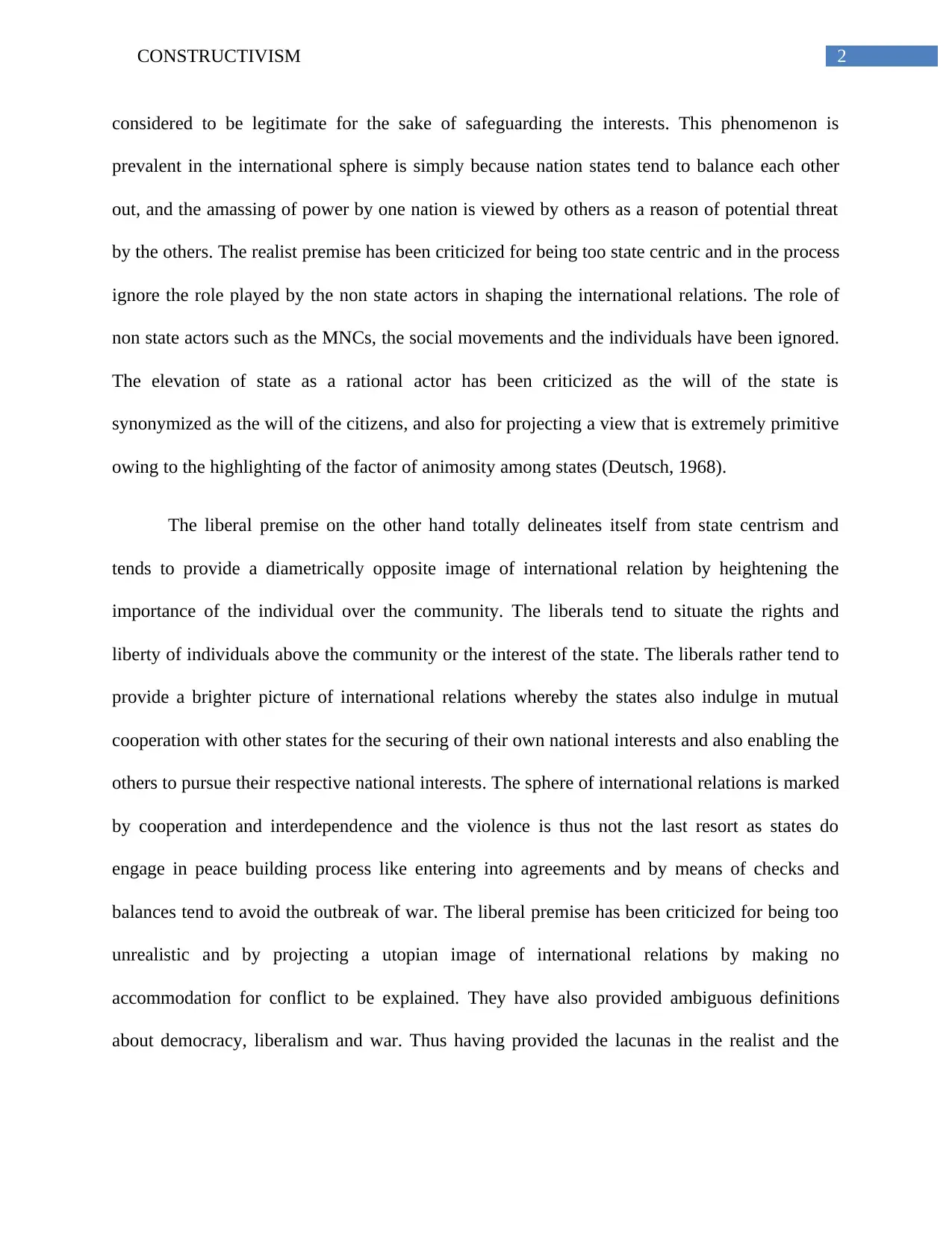
2CONSTRUCTIVISM
considered to be legitimate for the sake of safeguarding the interests. This phenomenon is
prevalent in the international sphere is simply because nation states tend to balance each other
out, and the amassing of power by one nation is viewed by others as a reason of potential threat
by the others. The realist premise has been criticized for being too state centric and in the process
ignore the role played by the non state actors in shaping the international relations. The role of
non state actors such as the MNCs, the social movements and the individuals have been ignored.
The elevation of state as a rational actor has been criticized as the will of the state is
synonymized as the will of the citizens, and also for projecting a view that is extremely primitive
owing to the highlighting of the factor of animosity among states (Deutsch, 1968).
The liberal premise on the other hand totally delineates itself from state centrism and
tends to provide a diametrically opposite image of international relation by heightening the
importance of the individual over the community. The liberals tend to situate the rights and
liberty of individuals above the community or the interest of the state. The liberals rather tend to
provide a brighter picture of international relations whereby the states also indulge in mutual
cooperation with other states for the securing of their own national interests and also enabling the
others to pursue their respective national interests. The sphere of international relations is marked
by cooperation and interdependence and the violence is thus not the last resort as states do
engage in peace building process like entering into agreements and by means of checks and
balances tend to avoid the outbreak of war. The liberal premise has been criticized for being too
unrealistic and by projecting a utopian image of international relations by making no
accommodation for conflict to be explained. They have also provided ambiguous definitions
about democracy, liberalism and war. Thus having provided the lacunas in the realist and the
considered to be legitimate for the sake of safeguarding the interests. This phenomenon is
prevalent in the international sphere is simply because nation states tend to balance each other
out, and the amassing of power by one nation is viewed by others as a reason of potential threat
by the others. The realist premise has been criticized for being too state centric and in the process
ignore the role played by the non state actors in shaping the international relations. The role of
non state actors such as the MNCs, the social movements and the individuals have been ignored.
The elevation of state as a rational actor has been criticized as the will of the state is
synonymized as the will of the citizens, and also for projecting a view that is extremely primitive
owing to the highlighting of the factor of animosity among states (Deutsch, 1968).
The liberal premise on the other hand totally delineates itself from state centrism and
tends to provide a diametrically opposite image of international relation by heightening the
importance of the individual over the community. The liberals tend to situate the rights and
liberty of individuals above the community or the interest of the state. The liberals rather tend to
provide a brighter picture of international relations whereby the states also indulge in mutual
cooperation with other states for the securing of their own national interests and also enabling the
others to pursue their respective national interests. The sphere of international relations is marked
by cooperation and interdependence and the violence is thus not the last resort as states do
engage in peace building process like entering into agreements and by means of checks and
balances tend to avoid the outbreak of war. The liberal premise has been criticized for being too
unrealistic and by projecting a utopian image of international relations by making no
accommodation for conflict to be explained. They have also provided ambiguous definitions
about democracy, liberalism and war. Thus having provided the lacunas in the realist and the
⊘ This is a preview!⊘
Do you want full access?
Subscribe today to unlock all pages.

Trusted by 1+ million students worldwide
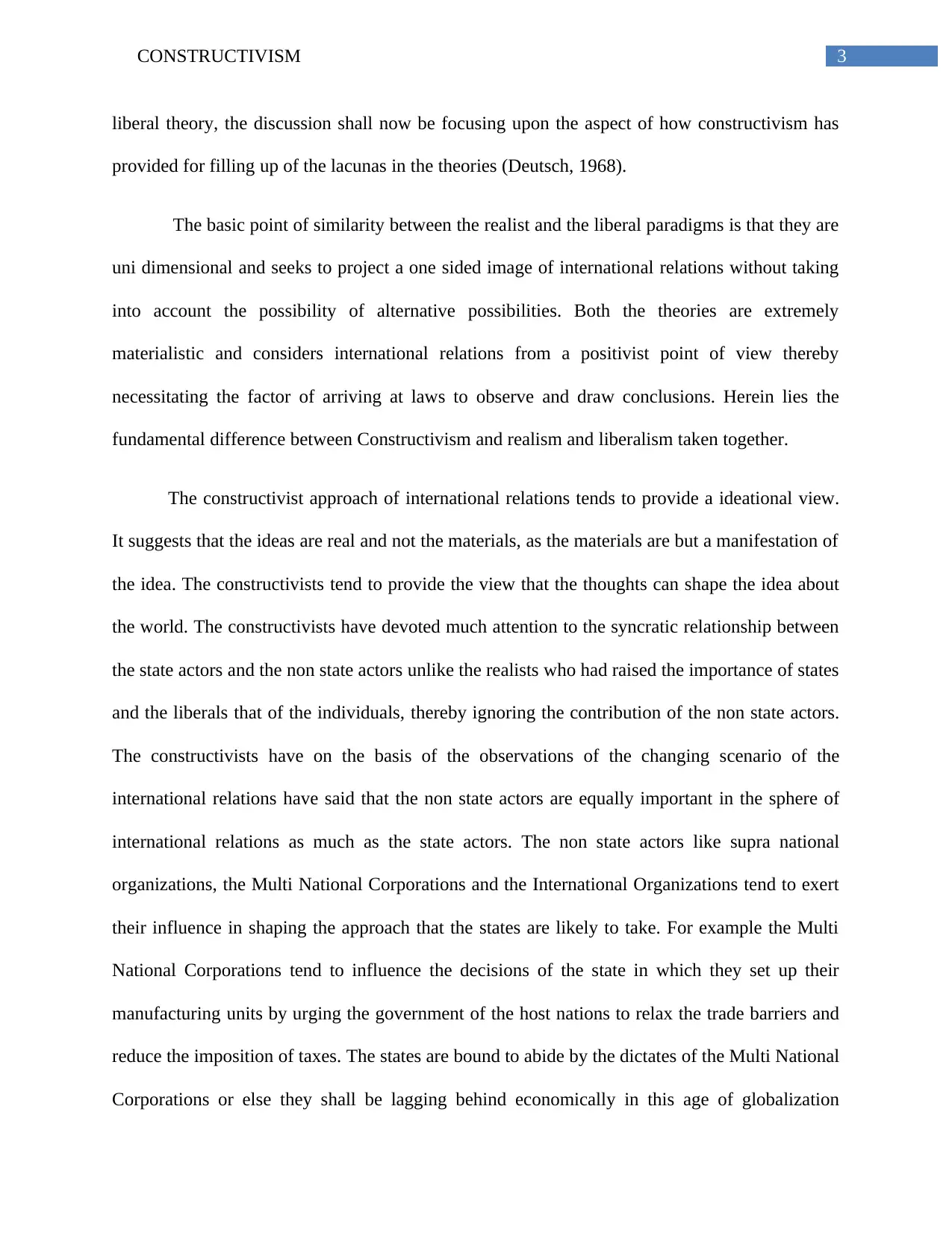
3CONSTRUCTIVISM
liberal theory, the discussion shall now be focusing upon the aspect of how constructivism has
provided for filling up of the lacunas in the theories (Deutsch, 1968).
The basic point of similarity between the realist and the liberal paradigms is that they are
uni dimensional and seeks to project a one sided image of international relations without taking
into account the possibility of alternative possibilities. Both the theories are extremely
materialistic and considers international relations from a positivist point of view thereby
necessitating the factor of arriving at laws to observe and draw conclusions. Herein lies the
fundamental difference between Constructivism and realism and liberalism taken together.
The constructivist approach of international relations tends to provide a ideational view.
It suggests that the ideas are real and not the materials, as the materials are but a manifestation of
the idea. The constructivists tend to provide the view that the thoughts can shape the idea about
the world. The constructivists have devoted much attention to the syncratic relationship between
the state actors and the non state actors unlike the realists who had raised the importance of states
and the liberals that of the individuals, thereby ignoring the contribution of the non state actors.
The constructivists have on the basis of the observations of the changing scenario of the
international relations have said that the non state actors are equally important in the sphere of
international relations as much as the state actors. The non state actors like supra national
organizations, the Multi National Corporations and the International Organizations tend to exert
their influence in shaping the approach that the states are likely to take. For example the Multi
National Corporations tend to influence the decisions of the state in which they set up their
manufacturing units by urging the government of the host nations to relax the trade barriers and
reduce the imposition of taxes. The states are bound to abide by the dictates of the Multi National
Corporations or else they shall be lagging behind economically in this age of globalization
liberal theory, the discussion shall now be focusing upon the aspect of how constructivism has
provided for filling up of the lacunas in the theories (Deutsch, 1968).
The basic point of similarity between the realist and the liberal paradigms is that they are
uni dimensional and seeks to project a one sided image of international relations without taking
into account the possibility of alternative possibilities. Both the theories are extremely
materialistic and considers international relations from a positivist point of view thereby
necessitating the factor of arriving at laws to observe and draw conclusions. Herein lies the
fundamental difference between Constructivism and realism and liberalism taken together.
The constructivist approach of international relations tends to provide a ideational view.
It suggests that the ideas are real and not the materials, as the materials are but a manifestation of
the idea. The constructivists tend to provide the view that the thoughts can shape the idea about
the world. The constructivists have devoted much attention to the syncratic relationship between
the state actors and the non state actors unlike the realists who had raised the importance of states
and the liberals that of the individuals, thereby ignoring the contribution of the non state actors.
The constructivists have on the basis of the observations of the changing scenario of the
international relations have said that the non state actors are equally important in the sphere of
international relations as much as the state actors. The non state actors like supra national
organizations, the Multi National Corporations and the International Organizations tend to exert
their influence in shaping the approach that the states are likely to take. For example the Multi
National Corporations tend to influence the decisions of the state in which they set up their
manufacturing units by urging the government of the host nations to relax the trade barriers and
reduce the imposition of taxes. The states are bound to abide by the dictates of the Multi National
Corporations or else they shall be lagging behind economically in this age of globalization
Paraphrase This Document
Need a fresh take? Get an instant paraphrase of this document with our AI Paraphraser
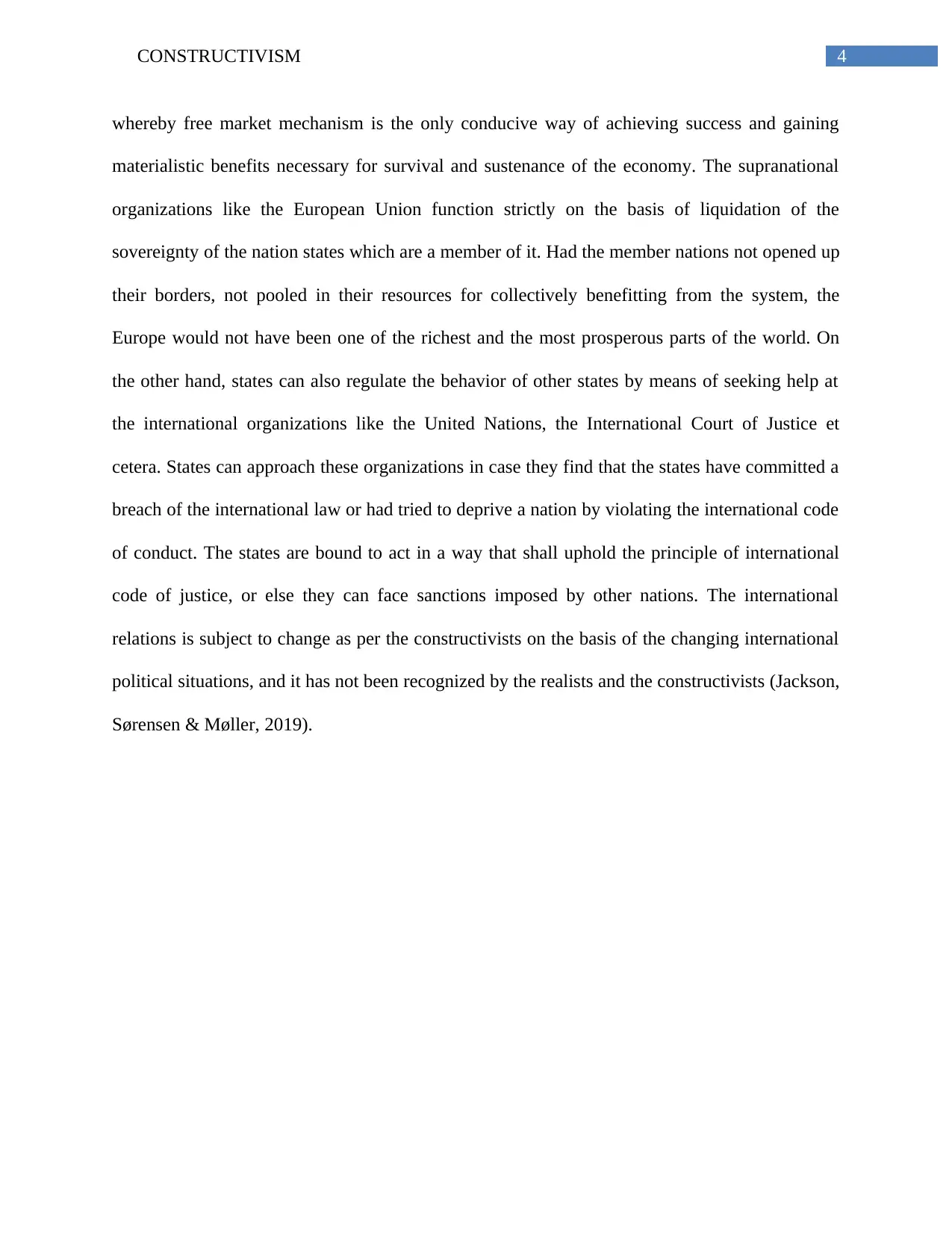
4CONSTRUCTIVISM
whereby free market mechanism is the only conducive way of achieving success and gaining
materialistic benefits necessary for survival and sustenance of the economy. The supranational
organizations like the European Union function strictly on the basis of liquidation of the
sovereignty of the nation states which are a member of it. Had the member nations not opened up
their borders, not pooled in their resources for collectively benefitting from the system, the
Europe would not have been one of the richest and the most prosperous parts of the world. On
the other hand, states can also regulate the behavior of other states by means of seeking help at
the international organizations like the United Nations, the International Court of Justice et
cetera. States can approach these organizations in case they find that the states have committed a
breach of the international law or had tried to deprive a nation by violating the international code
of conduct. The states are bound to act in a way that shall uphold the principle of international
code of justice, or else they can face sanctions imposed by other nations. The international
relations is subject to change as per the constructivists on the basis of the changing international
political situations, and it has not been recognized by the realists and the constructivists (Jackson,
Sørensen & Møller, 2019).
whereby free market mechanism is the only conducive way of achieving success and gaining
materialistic benefits necessary for survival and sustenance of the economy. The supranational
organizations like the European Union function strictly on the basis of liquidation of the
sovereignty of the nation states which are a member of it. Had the member nations not opened up
their borders, not pooled in their resources for collectively benefitting from the system, the
Europe would not have been one of the richest and the most prosperous parts of the world. On
the other hand, states can also regulate the behavior of other states by means of seeking help at
the international organizations like the United Nations, the International Court of Justice et
cetera. States can approach these organizations in case they find that the states have committed a
breach of the international law or had tried to deprive a nation by violating the international code
of conduct. The states are bound to act in a way that shall uphold the principle of international
code of justice, or else they can face sanctions imposed by other nations. The international
relations is subject to change as per the constructivists on the basis of the changing international
political situations, and it has not been recognized by the realists and the constructivists (Jackson,
Sørensen & Møller, 2019).
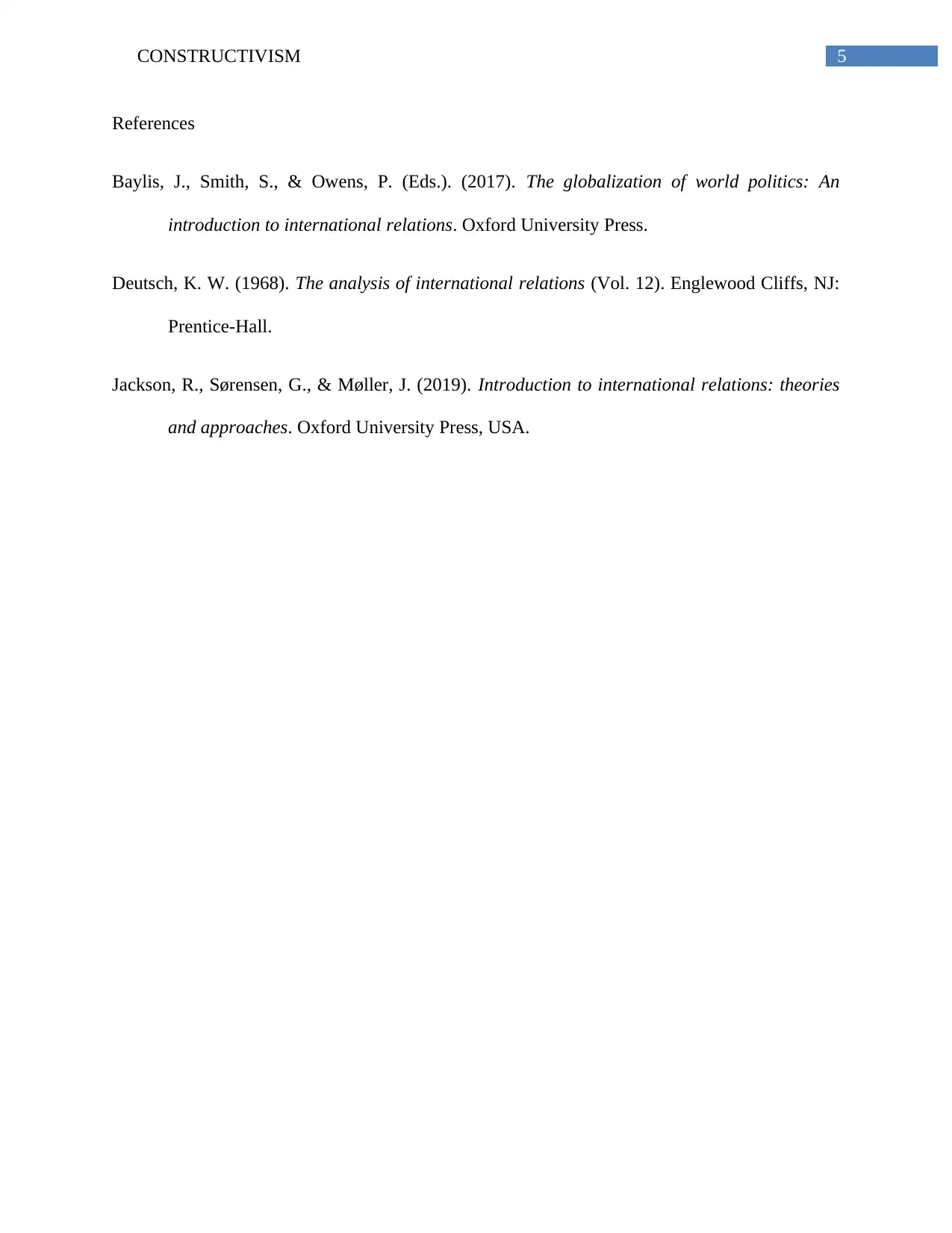
5CONSTRUCTIVISM
References
Baylis, J., Smith, S., & Owens, P. (Eds.). (2017). The globalization of world politics: An
introduction to international relations. Oxford University Press.
Deutsch, K. W. (1968). The analysis of international relations (Vol. 12). Englewood Cliffs, NJ:
Prentice-Hall.
Jackson, R., Sørensen, G., & Møller, J. (2019). Introduction to international relations: theories
and approaches. Oxford University Press, USA.
References
Baylis, J., Smith, S., & Owens, P. (Eds.). (2017). The globalization of world politics: An
introduction to international relations. Oxford University Press.
Deutsch, K. W. (1968). The analysis of international relations (Vol. 12). Englewood Cliffs, NJ:
Prentice-Hall.
Jackson, R., Sørensen, G., & Møller, J. (2019). Introduction to international relations: theories
and approaches. Oxford University Press, USA.
⊘ This is a preview!⊘
Do you want full access?
Subscribe today to unlock all pages.

Trusted by 1+ million students worldwide
1 out of 6
Your All-in-One AI-Powered Toolkit for Academic Success.
+13062052269
info@desklib.com
Available 24*7 on WhatsApp / Email
![[object Object]](/_next/static/media/star-bottom.7253800d.svg)
Unlock your academic potential
Copyright © 2020–2026 A2Z Services. All Rights Reserved. Developed and managed by ZUCOL.


